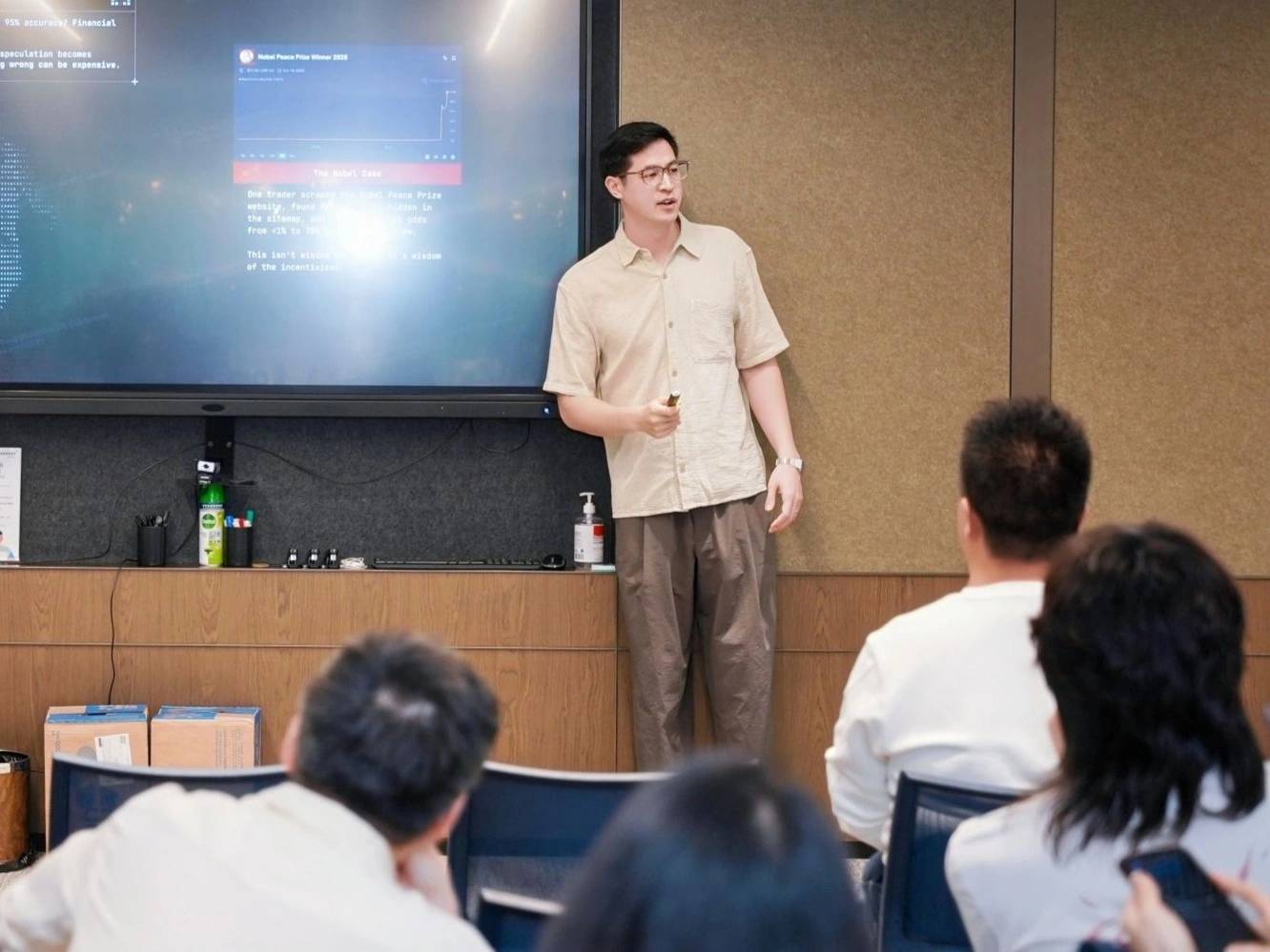위키 구독하기
Share wiki
Bookmark
Leo Chan
0%
Leo Chan
**레오 찬(Leo Chan)**은 비트텐서 네트워크의 서브넷인 Sportstensor와 예측 시장 플랫폼인 Almanac Market의 설립자이자 최고 경영자(CEO)입니다. 찬은 예측 시장 산업의 규제, 가치 평가 및 미래 잠재력에 대한 공개적인 논평으로 알려져 있습니다. [1] [2]
교육
찬은 2009년부터 2013년까지 뉴사우스웨일스 대학교(UNSW)에 다녔습니다. 그는 산업 및 제품 디자인을 전공하여 산업 디자인 학사 학위를 받았습니다. [3] [1] [2]
경력
Sportstensor
Sportstensor는 비트텐서 네트워크의 서브넷으로, 찬은 이를 "비트텐서의 정신"을 대표한다고 설명합니다. 설립자 겸 CEO로서 찬은 개발 및 홍보에 적극적으로 참여해 왔습니다. 2025년 4월 15일, 그는 Sportstensor와 더 넓은 비트텐서 네트워크를 프로 NBA 팀의 벤처 펀드에 발표했습니다. 2025년 10월에는 커뮤니티 회원으로부터 홍콩에서 열리는 행사에서 프로젝트를 발표해 달라는 초대를 받았습니다. [1]
Almanac Market
2025년 10월 1일, 찬은 두 번째 벤처인 Almanac Market을 공식적으로 발표했습니다. 이 플랫폼은 "예측 시장에서 진실을 장려하는" 사명을 가진 예측 시장입니다. 출시 홍보 자료에서는 사용자에게 최대 10만 달러의 주간 보상을 강조했습니다. 찬의 예측 시장 분야 참여는 자신의 회사를 넘어섭니다. 2025년 9월, 그는 이 분야가 "절대적으로 호황"이라고 언급하며 Polymarket 및 Kalshi를 포함한 다른 주요 플랫폼의 팀과 대화를 나눴다고 언급했습니다. [1]
견해 및 논평
찬은 예측 시장 산업에 대한 적극적인 논평가로서 규제 환경, 경제적 정당성 및 장기적인 잠재력에 대한 의견을 제시합니다. 그의 견해는 2025년 10월 기사에 자세히 설명되어 있습니다. [2]
규제 및 거버넌스에 대하여
찬은 미국에서 예측 시장에 대한 통일된 연방 규제 프레임워크를 옹호해 왔습니다. 그는 스포츠 베팅에서 볼 수 있는 것과 유사하게 단편적인 주 차원의 규칙이 플랫폼과 사용자 모두에게 혼란을 야기한다고 주장했습니다. 그의 견해로는 일관된 연방 접근 방식이 필요한 명확성을 제공할 것입니다. 그는 예측 시장이 "옵션과 매우 유사하게" 작동하기 때문에 금융 옵션에 사용되는 것과 유사한 규제 프레임워크에 따라 감독해야 한다고 제안했습니다.
전 세계적으로 찬은 영국을 예측 시장 성장에 상당한 잠재력이 있는 관할 구역으로 확인했습니다. 그는 이 나라의 "균형 잡힌 도박법과 '초금융화된' 문화"를 초기 채택을 촉진할 수 있는 핵심 요소로 꼽았습니다. [2]
시장 가치 평가에 대하여
찬은 예측 시장 플랫폼의 높은 가치 평가가 순전히 투기적이라는 주장에 맞서 옹호해 왔습니다. 그는 그러한 가치 평가가 "글로벌 금융 전반에 걸쳐 정보 흐름을 재구성하는" 기술의 장기적인 잠재력에 의해 정당화된다고 주장했습니다. 그는 단기적인 수익에 집중하기보다는 대규모로 "집단적 예측"을 수익화하는 능력에 가치가 있다고 믿습니다. [2]
시장 성장 및 채택에 대하여
찬에 따르면 예측 시장의 사용자 채택은 종종 주요 외부 이벤트에 의해 주도되는 급증으로 발생합니다. 그는 선거, 주요 스포츠 시즌 및 중요한 속보를 이러한 플랫폼에 새로운 사용자를 유치하는 핵심 촉매제로 확인했습니다. [2]
그는 이 분야 내의 재정적 기회에 대해 강한 낙관론을 표명했습니다. 2025년 10월 2일, 그는 "만약 당신이 앞으로 3개월 동안 일주일에 7일, 하루에 12시간씩 예측 시장을 공부한다면 10만 달러 이상을 벌 수 있을 것이라고 진심으로 믿습니다."라고 말했습니다. 한 달 전인 2025년 9월 10일, 그는 업계의 추진력에 대해 언급하며 "예측 시장 공간은 절대적으로 호황입니다... 이 기차를 막을 수 없습니다. 그에 따라 자신을 배치하십시오."라고 말했습니다. [1]
미래 잠재력에 대하여
찬은 예측 시장의 장기적인 사회적 영향에 대해 추측하면서 "미래 정부"의 발전으로 이어질 수 있다고 제안했습니다. 이것은 전통적인 투표 방식이 아닌 예측 시장의 결과에 따라 공공 정책이 결정되는 이론적인 형태의 거버넌스이며, 참가자들은 어떤 정책이 가장 성공적인 결과를 낳을지에 베팅합니다. [2]
잘못된 내용이 있나요?
